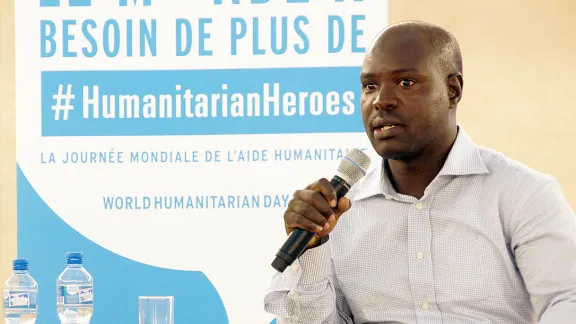
Lokiru Yohana sharing impressions from the field at the UN panel on World Humanitarian Day. Photo: LWF/ C. Kästner
Tribute to “Enormous Sacrifices” Made by Humanitarians and Their Families
(LWI) – “Humanitarian workers make enormous sacrifices. Many are separated from their families and sacrifice their health, relationships and resources, and sometimes even their lives,” Lutheran World Federation (LWF) Program Officer for East and Horn of Africa and Climate Change Lokiru Matendo Yohana said.
Taking part in a United Nations panel in Geneva to mark World Humanitarian Day, Yohana paid tribute to the “enormous sacrifices” made by aid workers around the world who carry out life-saving activities, often in dangerous and difficult circumstances.
“Behind every humanitarian are people who also make sacrifices – whether it’s their families, those giving funds to facilitate assistance, raising a voice on behalf of the afflicted or opening their doors to allow refugees into their countries.” Yohana added.
“Make things better for people”
Yohana, who has been in his current position since July, previously worked for two years as the LWF Program Coordinator in South Sudan. He became interested in humanitarian work as a boy growing up in northern Kenya.
“There was a lot of poverty in my country, many people suffering from the effects of drought and also at the time a big influx of South Sudanese refugees. I wanted to be part of a network and a worldwide effort of making things better for people,” he said.
Violence against aid workers has reached the highest number ever recorded, according to a UN–commissioned study, conducted by Humanitarian Outcomes. 155 aid workers were killed in 2013 and three-quarters of all attacks took place in just five countries: Afghanistan, Syria, South Sudan, Pakistan and Sudan. Preliminary figures show that as of mid-August 2014, 79 aid workers have been killed in conflict zones. The months of July and August saw a rise in the level of attacks and incidents involving aid workers including in Gaza and South Sudan.
The panel, which included International Organization for Migration Director General Ambassador William L. Swing and Care International Humanitarian Director Barbara Jackson, focused on hearing the stories of people who are dedicated to protecting and supporting those who have had their lives torn apart by conflict or natural disasters. This year, humanitarian agencies, including the LWF, are planning to support an estimated 76 million people in 31 countries.
UN Flag “No Longer Source of Protection”
Jackson said both the bravery and neutrality of aid workers needed to be remembered and respected.
“Humanitarians continue to be relied upon to provide crucial life-saving aid amidst extremely difficult and stressful circumstances,” she said. “The risks these people face are substantial: death, injuries, kidnapping. It’s absolutely essential that all parties respect the impartiality of aid workers so we can continue to help those most in need.”
“We are living in an era of unprecedented human mobility, humanitarian disasters and anti-migrant and anti-foreigner sentiment,” Swing said. “The UN flag or NGOs’ identity is no longer a source of protection for humanitarian workers. Instead, it is a way to find out who you are and where you are. We need to restore the level of humanitarian protection.”
World Humanitarian Day is observed annually on 19 August, the anniversary of the 2003 bombing of the UN headquarters in Bagdad that killed 22 people, including UN envoy Sergio Vieira de Mello. It is a tribute to aid workers, a commemoration to those who have lost their lives and a celebration of the spirit of humanitarian work around the world.
This year under the theme, “The world needs more Humanitarian Heroes,” first-hand accounts were heard from humanitarians working on the front-line of the world’s most dangerous conflicts.


